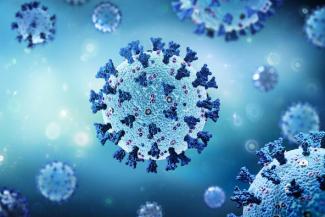UK Part of National Collaboration to Study Long COVID-19

The University of Kentucky is participating in a nationwide study that seeks to understand why some people have prolonged symptoms (long COVID) or develop new or returning symptoms after an acute bout of SARS-CoV-2 infection.
UK College of Medicine researchers will enroll more than 80 adult participants from Kentucky: some who have had COVID-19 and others who have not. Participants will be followed for up to four years to identify risk factors and occurrences of long COVID, medically known as post-acute sequelae of SARS-CoV-2 infection (PASC).
This study is part of the National Institutes of Health “Researching COVID to Enhance Recovery” (RECOVER) Initiative. The NIH awarded the $470 million RECOVER parent award to more than 100 researchers at more than 30 institutions, creating a large-scale, national study population of diverse research volunteers, that is being coordinated by the RECOVER Clinical Science Core located at New York University Langone Health.
Together, these studies are expected to provide insights over the coming months into many important questions including the incidence and prevalence of long-term effects from SARS-CoV-2 infection, the range of symptoms, underlying causes, risk factors, outcomes, and potential strategies for treatment and prevention.
UK has partnered with West Virginia University and nine other institutions to form the IDeA States Consortium for Clinical Research (ISCORE) network, which ensures that the unique needs of the rural and medically underserved communities of Kentucky will be represented in the RECOVER study.
“We get to help tell the story of the impact of COVID-19 on our state and better understand how to help our citizens recover from it,” said Zach Porterfield, M.D., Ph.D., assistant professor in the UK Department of Microbiology, Immunology and Molecular Genetics, who is co-leading the study.
Of the 45 million COVID-19 cases in the U.S., it is estimated that 10-30% are “long haulers.” According to the Centers for Disease Control and Prevention, people commonly report prolonged symptoms including difficulty breathing or shortness of breath, tiredness or fatigue, cough, difficulty thinking or concentrating (‘brain-fog”), chest or stomach pain, headache and cardiovascular complications including thrombosis.
This project draws multidisciplinary expertise from across the UK College of Medicine including the Departments of Microbiology, Immunology and Genetics; Molecular and Cellular Biochemistry; and Internal Medicine (Cardiology and Infectious Disease Divisions). The project is made possible by the support from UK’s Center for Clinical and Translational Science (CCTS) and the Virus Induced Thrombosis Alliance (VITAL). The VITAL team, funded through the College of Medicine’s Research Alliance Initiative, investigates why viral infections cause an increased risk of cardiovascular disease. VITAL research early in the COVID-19 pandemic suggested the risk of thrombosis could persist after the SARS-CoV-2 infection clears.
“This important study is a wonderful example of how teams of clinicians, basic scientists, and support staff at UK work together to address health care problems in the Commonwealth and the nation,” said the study's co-principal investigator Sidney Whiteheart, Ph.D., professor in the Department of Molecular and Cellular Biochemistry.
For those interested in learning more about this study or participating, please email KITE@uky.edu.
Research reported in this publication was supported by the National Heart, Lung, and Blood Institute of the National Institutes of Health under Award Number 1OT2HL16184701. The content is solely the responsibility of the authors and does not necessarily represent the official views of the National Institutes of Health.

